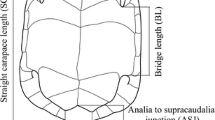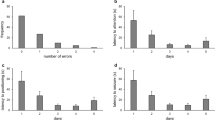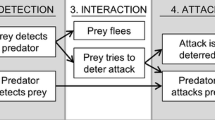Abstract
Differences in gender and age and the balance between aggressive behavior and the ability to escape are fundamental in predator–prey interactions, as well as for survival, foraging, and mating success. We investigated the defensive behavior of the scorpion Tityus pusillus and assessed possible differences in their behavior responses associated with sex, age, and diel period, by simulating a predation threat. Predator attacks were simulated by pressing the telsons with forceps, dropping the animals from a height of 25 cm on a plastic tray, restraining the pincers using large rubber-tipped tweezers, or restricting the prosoma. Tityus pusillus (Buthidae) showed five defensive behaviors: thanatosis, fleeing, stinging, standing still, and tail wagging. The scorpions responded with thanatosis or fleeing when their telsons were restricted. The frequency of these responses varied with sex and diel period. Stinging was the primary behavior response to prosoma restriction in both adults and juveniles while standing still was the most frequently observed behavior response to restraining pincers. These results indicate that the plasticity of defensive behavior in T. pusillus in response to predation is influenced by sex, age, diel period, and the body part targeted by the predator.


Similar content being viewed by others
References
Albuquerque CMR, Lira AFA (2016) Insights into reproductive strategies of Tityus (Archaeotityus) pusillus Pocock, 1893 (Scorpiones, Buthidae). C R Biol 339:179–184. https://doi.org/10.1016/j.crvi.2016.03.003
Breed MD, Robinson GE, Page RE Jr (1990) Division of labor during honey bee colony defense. Behav Ecol Sociobiol 27:395–401. https://doi.org/10.1007/BF00164065
Brownell P, Farley RD (1979) Prey-localizing behaviour of the nocturnal desert scorpion, Paruroctonus mesaensis: orientation to substrate vibrations. Anim Behav 27:185–193. https://doi.org/10.1016/0003-3472(79)90138-6
Carlson BE, Rowe MP (2009) Temperature and desiccation effects on the antipredator behavior of Centruroides vittatus (Scorpiones: Buthidae). J Arachnol 37:321–330. https://doi.org/10.1636/Hi09-06.1
Carlson BE, McGinley S, Rowe MP (2014) Meek males and fighting females: sexually-dimorphic antipredator behavior and locomotor performance is explained by morphology in bark scorpions (Centruroides vittatus). PLoS One 9:e97648. https://doi.org/10.1371/journal.pone.0097648
Coelho P, Kaliontzopoulou A, Rasko M, van der Meijden A (2017) A ‘striking’ relationship: scorpion defensive behaviour and its relation to morphology and performance. Funct Ecol 31:1390–1404. https://doi.org/10.1111/1365-2435.12855
Dangles O, Pierre D, Christides JP, Casas J (2007) Escape performance decreases during ontogeny in wild crickets. J Exp Biol 210:3165–3170. https://doi.org/10.1242/jeb.004648
Dionisio-da-Silva W, Lira AFA, Albuquerque CMR (2018) Distinct edge effects and reproductive periods of sympatric litter-dwelling scorpions (Arachnida: Scorpiones) in a Brazilian Atlantic forest. Zoology 129:17–24. https://doi.org/10.1016/j.zool.2018.06.001
Effertz C, von Elert E (2014) Light intensity controls anti-predator defenses in Daphnia: the suppression of life-history changes. Proc R Soc Lond 281:20133250. https://doi.org/10.1098/rspb.2013.3250
Fleming PA, Muller D, Bateman PW (2007) Leave it all behind: a taxonomic perspective of autotomy in invertebrates. Biol Rev 82:481–510. https://doi.org/10.1111/j.1469-185X.2007.00020.x
Gaffin DD, Brownell PH (2010) Evidence of chemical signaling in the sand scorpion, Paruroctonus mesaensis (Scorpionida: Vaejovida). Ethology 91:59–69. https://doi.org/10.1111/j.1439-0310.1992.tb00850.x
Gnaspini P, Hara MR (2007) Defense mechanisms. In: Pinto-da-Rocha R, Machado G, Giribet G (eds) Harvestmen: the biology of opiliones. Harvard University Press, Harvard, pp 374–399
Haight KL (2008) Ontogeny of the defensive stinging behavior of the fire ant, Solenopsis invicta. J Insect Behav 21:147–152. https://doi.org/10.1007/s10905-007-9114-z
Hammer Ø, Harper DAT, Ryan PD (2001) PAST: Paleontological statistics software package for education and data analysis. Palaeontologia Electronica
Husak JF, Macedonia JM, Fox SF, Sauceda RS (2006) Predation cost of conspicuous male coloration in collared lizards (Crotaphytus collaris): an experimental test using clay-covered model lizards. Ethology 112:572–580. https://doi.org/10.1111/j.1439-0310.2005.01189.x
Jeanne RL, Williams NM, Yandell BS (1992) Age polyethism and defense in a tropical social wasp (Hymenoptera: Vespidae). J Insect Behav 5:211–227. https://doi.org/10.1007/BF01049290
Jones TC, Akoury TS, Hauser CK, Moore D (2011) Evidence of circadian rhythm in antipredator behaviour in the orb-weaving spider Larinioides cornutus. Anim Behav 82:549–555. https://doi.org/10.1016/j.anbehav.2011.06.009
Judd TM (2000) Division of labor in colony defense against vertebrate predators by the social wasp Polistes fuscatus. Anim Behav 60:55–61. https://doi.org/10.1006/anbe.2000.1449
Kats LB, Dill LM (1998) The scent of death: chemosensory assessment of predation risk by prey animals. Ecoscience 5:361–394. https://doi.org/10.1080/11956860.1998.11682468
Lima SL, Dill LM (1990) Behavioral decisions made under the risk of predation: a review and prospectus. Can J Zool 68:619–640. https://doi.org/10.1139/z90-092
Lira AFA, Souza AM, Silva Filho AAC, Albuquerque CMR (2013) Spatio-temporal microhabitat use by two co-occurring species of scorpions in Atlantic rainforest in Brazil. Zoology 116:182–185. https://doi.org/10.1016/j.zool.2013.01.002
Lira AFA, Rego FNAA, Albuquerque CMR (2015) How important are environmental factors for the population structure of co-occurring scorpion species in a tropical forest? Can J Zool 93:15–19. https://doi.org/10.1139/cjz-2014-0238
Lira AFA, Araújo VFN, Albuquerque CMR (2016) Predation of a scorpion (Scorpiones: Buthidae) by an assassin bug (Heteroptera: Reduviidae) in the Brazilian Atlantic Forest. Turk J Zool 40:294–296. https://doi.org/10.3906/zoo-1504-27
Lira AFA, Pordeus LM, Albuquerque CMR (2017a) A new species of Ananteris (Scorpiones: Buthidae) from Caatinga biome, Brazil. Acta Arachnol 66:9–15. https://doi.org/10.2476/asjaa.66.9
Lira AFA, DeSouza AM, Albuquerque CMR (2017b) Report of intraguild predation and cannibalism in scorpions (Scorpiones: Buthidae) in the Brazilian Atlantic forest. North-West J Zool 13:356–358
Lira AFA, DeSouza AM, Albuquerque CMR (2018a) Environmental variation and seasonal changes as determinants of the spatial distribution of scorpions (Arachnida: Scorpiones) in Neotropical forests. Can J Zool 96:963–972. https://doi.org/10.1139/cjz-2017-0251
Lira AFA, Pordeus LM, Rego FNAA, Iannuzzi K, Albuquerque CMR (2018b) Sexual dimorphism and reproductive behavior in the Brazilian scorpion Tityus pusillus (Scorpiones, Buthidae). Invert Biol 137:221–230. https://doi.org/10.1111/ivb.12221
Machan L (1968) Spectral sensitivity of scorpion eyes as possible roles of shielding pigment effect. J Exp Biol 49:95–105
McIntosh AR, Townsend CR (1994) Interpopulation variation in mayfly antipredator tactics: differential effects of contrasting predatory fish. Ecology 75:2078–2090. https://doi.org/10.2307/1941612
Melville JM, Tallarovic SK, Brownell PH (2003) Evidence of mate trailing in the giant hairy desert scorpion, Hadrurus arizonensis (Scorpionida, Iuridae). J Insect Behav 16:97–115. https://doi.org/10.1023/A:1022853413104
Miller DW, Jones AD, Goldston JS, Rowe MP, Rowe AH (2016) Sex differences in defensive behavior and venom of the striped bark scorpion Centruroides vittatus (Scorpiones: Buthidae). Integr Comp Biol 56:1022–1031. https://doi.org/10.1093/icb/icw098
Mineo MF, Del Claro K (2006) Mechanoreceptive function of pectines in the Brazilian yellow scorpion Tityus serrulatus: perception of substrate-borne vibrations and prey detection. Acta Ethol 9:79–85. https://doi.org/10.1007/s10211-006-0021-7
Moreno-González JA, Hazzi NA (2012) Intraguild predation case: Tityus forcipula Gervais, 1843 (Scorpiones, Buthidae) feeding on Chactas vanbenedeni Gervais, 1843 (Scorpiones, Chactidae) in Colombia. Rev Ibér Aracnol 20:117–120
Persons MH, Rypstra AL (2000) Preference for chemical cues associated with recent prey in the wolf spider Hogna helluo (Araneae: Lycosidae). Ethology 106:27–35. https://doi.org/10.1046/j.1439-0310.2000.00496.x
Polis GA (1990) The biology of scorpions. University Press, Stanford
Polis GA, McCormick SJ (1987) Intraguild predation and competition among desert scorpions. Ecology 68:332–343. https://doi.org/10.2307/1939264
Polis GA, Myers CA, Holt RD (1989) The ecology and evolution of intraguild predation. Ann Rev Ecol Evol Syst 20:297–330. https://doi.org/10.1146/annurev.es.20.110189.001501
Pomini AM, Machado G, Pinto-da-Rocha R, Macías-Ordóñez R, Marsaioli AJ (2010) Lines of defense in the harvestman Hoplobunus mexicanus (Arachnida: Opiliones): Aposematism, stridulation, thanatosis, and irritant chemicals. Biochem Syst Ecol 38:300–308. https://doi.org/10.1016/j.bse.2010.03.003
Porto TJ, Brazil TK, Lira-da-Silva RM (2010) Scorpions, state of Bahia, northeastern Brazil. Check List 6:292–297
Preisser EL, Orrock JL (2012) The allometry of fear: interspecific relationships between body size and response to predation risk. Ecosphere 3:1–27. https://doi.org/10.1890/ES12-00084.1
Ramirez RA, Crowder DW, Snyder GB, Strand MR, Snyder WE (2010) Antipredator behavior of Colorado potato beetle larvae differs by instar and attacking predator. Biol Control 53:230–237. https://doi.org/10.1016/j.biocontrol.2010.01.004
Sansom A, Lind J, Cresswell W (2009) Individual behavior and survival: the roles of predator avoidance, foraging success, and vigilance. Behav Ecol 20:1168–1174. https://doi.org/10.1093/beheco/arp110
Santos GCSG, Dionisio-da-Silva W, Souza-Alves JP, Albuquerque CMR, Lira AFA (2018) Random or clumped: how litter dwelling scorpions are distributed in a fragment of Brazilian Atlantic forest. Eur J Entomol 115:445–449
Taylor MS, Cosper CR, Gaffin DD (2012) Behavioral evidence of pheromonal signaling in desert grassland scorpions Paruroctonus utahensis. J Arachnol 40:240–244
Toscano-Gadea CA, Costa FG (2006) Is Tityus uruguayensis (Buthidae) an araneophagic scorpion? An experimental analysis of its predatory behaviour on spiders and insects. Bull Brit Arachnol Soc 13:256–264
Troupe JE (2009) Ontogenetic shift in agonistic behavior of the southern black widow spider, Latrodectus mactans (Araneae: Theridiidae). Thesis, University of Tennessee, Knoxville
Tullberg BS, Merilaita S, Wiklund C (2005) Aposematism and crypsis combined as a result of distance dependence: functional versatility of the colour pattern in the swallowtail butterfly larva. Proc Biol Sci R Soc 272:1315–1321. https://doi.org/10.1098/rspb.2005.3079
Uma DB, Weiss MR (2012) Flee or fight: ontogenetic changes in the behavior of cobweb spiders in encounters with spider-hunting wasps. Environ Entomol 41:1474–1480. https://doi.org/10.1603/EN12126
van der Meijden A, Coelho PL, Sousa P, Herrel A (2013) Choose your weapon: defensive behavior is associated with morphology and performance in scorpions. PLoS One 8:e78955. https://doi.org/10.1371/journal.pone.0078955
Vitt LJ, Cooper WE Jr (1986) Foraging and diet of a diurnal predator (Eumeces laticeps) feeding on hidden prey. J Herpetol. https://doi.org/10.2307/1564503
Warburg M (1998) Qualitative and quantitative analysis of intra-and interspecific behavioural patterns among scorpions. J Ethol 16:115–121. https://doi.org/10.1007/BF02769290
Watts JC, Herrig A, Allen WD, Jones TC (2014) Diel patterns of foraging aggression and antipredator behaviour in the trashline orb-weaving spider, Cyclosa turbinata. Anim Behav 94:79–86. https://doi.org/10.1016/j.anbehav.2014.05.020
Werner E, Gilliam J (1984) The ontogenetic niche and species interactions in size-structured populations. Annu Rev Ecol Evol Syst 15:393–426. https://doi.org/10.1146/annurev.es.15.110184.002141
Williams JL, Snyder WE, Wise DH (2001) Sex-based differences in antipredator behavior in the spotted cucumber beetle (Coleoptera: Chrysomelidae). Environ Entomol 30:327–332. https://doi.org/10.1603/0046-225X-30.2.327
Acknowledgements
We are grateful to Coordenação de Aperfeiçoamento de Pessoal de Nível Superior (CAPES) for granting a PhD scholarship to A.F.A. Lira and to Conselho Nacional de Desenvolvimento Científico e Tecnológico (CNPq) (Fellowship #307759/2015-6 for research productivity) for a financial support for C.M.R. Albuquerque. We also grateful to Fundação de Amparo a Ciência e Tecnologia de Pernambuco (FACEPE) for financial support (APQ-0437-2.04/15).
Author information
Authors and Affiliations
Corresponding author
Ethics declarations
Conflict of interest
Experiments using invertebrate animals conducted in Brazil do not require approval by the Ethics Committees, as established by the Brazilian Council for the Control of Animal Experimentation (CONCEA) (Law 11.794/08, § 3). In addition, the authors declare no potential conflicts of interest.
Additional information
Publisher's Note
Springer Nature remains neutral with regard to jurisdictional claims in published maps and institutional affiliations.
Electronic supplementary material
Below is the link to the electronic supplementary material.
About this article
Cite this article
Lira, A.F.A., Almeida, F.M.F. & Albuquerque, C.M.R. Reaction under the risk of predation: effects of age and sexual plasticity on defensive behavior in scorpion Tityus pusillus (Scorpiones: Buthidae). J Ethol 38, 13–19 (2020). https://doi.org/10.1007/s10164-019-00615-4
Received:
Accepted:
Published:
Issue Date:
DOI: https://doi.org/10.1007/s10164-019-00615-4




